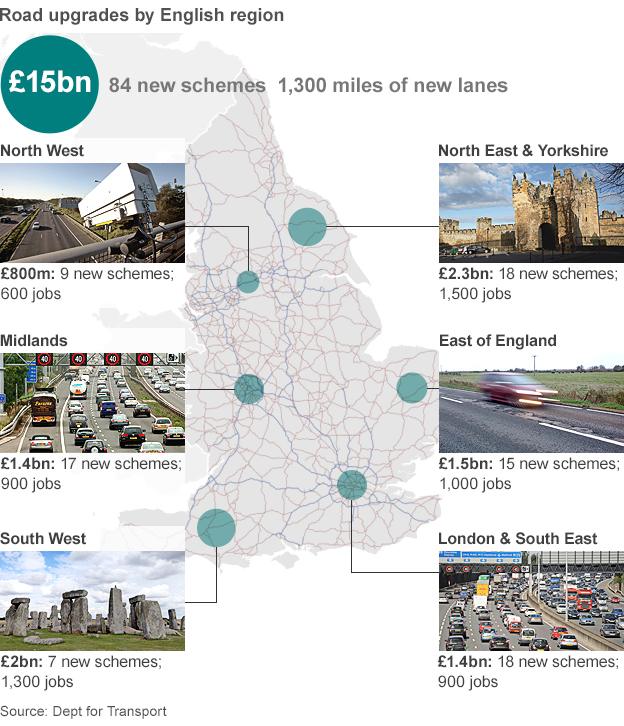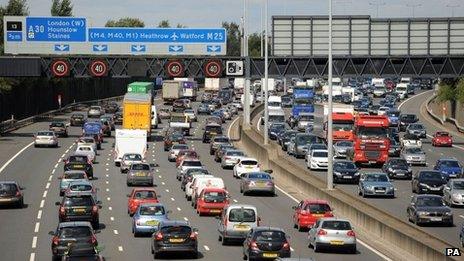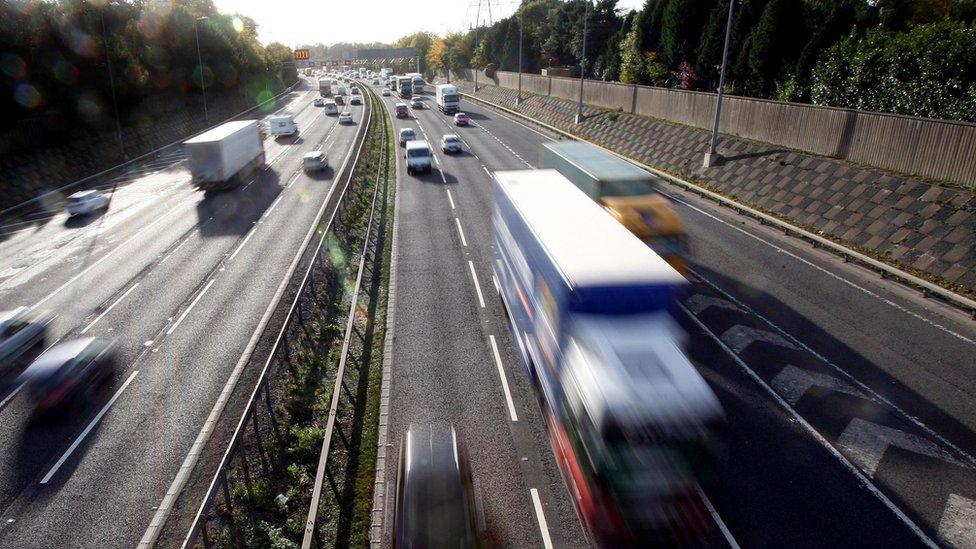Roads funding: £15bn to be spent on schemes for England
- Published
- comments
Richard Westcott: "People will be able to come here without listening to the cars in the background"
A tunnel on the A303 at Stonehenge is among dozens of new road plans to be announced by the government, as part of a £15bn "roads revolution" for England.
The money - initially announced in 2013 - will involve 100 road improvement schemes and add 1,300 new miles of extra lanes to motorways and A roads.
The projects include the tunnel to tackle a bottleneck at Stonehenge on the A303 and improved M25 junctions.
Labour said the coalition's record was one of "all talk and no delivery".
'Biggest and boldest'
The tunnel near the historic Stonehenge site in Wiltshire is among the 84 new projects announced, with the government saying the £15bn would be spent over the next five years.
The plans are part of the chancellor's Autumn Statement to be announced in full on Wednesday.
The road plans include improvements designed to tackle congestion on the A27 along the south coast and better links into Port of Liverpool. There will also be more money to upgrade the A1 in the North East.


Among the major plans are:
North West: , externalImproving links to the Port of Liverpool
North West and Yorkshire: , externalCompleting the "smart" lane on the M62 from Manchester to Leeds
North East: , external£290m to make the A1 dual carriageway all the way from London to Ellingham, 25 miles from the Scottish border
Midlands:, external Improving the M42 to the east of Birmingham
East:, external £300m to upgrade the east-west connection to Norfolk, by making sections of the A47 dual carriageway and improving its connections to the A1 and A11
South West: , external£2bn to make the entire A303 and A358 to the region dual carriageway, including a tunnel at Stonehenge
London and South East:, external Improving one-third of the junctions on the M25, £350m of improvements to the A27 along the south coast

Announcing the plan, Transport Secretary Patrick McLoughlin said roads were "key to our nation's prosperity" and had suffered from under-investment for too long.
"Today I am setting out the biggest, boldest and most far-reaching roads programme for decades. It will dramatically improve our road network and unlock Britain's economic potential," he said.
Chancellor George Osborne said it would "transform some of the country's most important strategic routes".

Analysis

Richard Westcott, BBC Transport Correspondent
This is a large amount of money and a large number of schemes. The big question now, from many I've spoken to in the industry, is will they see it through?
Governments have a habit of announcing big plans for the roads, only to shelve them later on when the money gets tight.
It happened in the late 1980s when Margaret Thatcher promised the largest road building programme since the Romans.
The last Labour government was also going to build a tunnel under Stonehenge, until the costs got silly.
Even this coalition started life by announcing road maintenance budget cuts and cancelling projects.
Upcoming changes to the Highways Agency, giving it a guaranteed budget every five years, are meant to put an end to all that uncertainty.

The plans, described as a "roads revolution" by ministers, have been published in the first ever Road Investment Strategy, external.
They are designed to tackle congestion and fix some of the most notorious trouble spots on the country's roads, the government said.
Motoring groups welcomed the plans. RAC Foundation director Professor Stephen Glaister said: "This is not about concreting over the countryside with new roads but upgrading many existing routes which have been the source of misery to motorists for years if not decades.
"That the government is investing money along whole lengths of roads and not just a mile or two here and there is to be welcomed."
AA president Edmund King said the UK's roads carried 86% of passenger journeys and more than 90% of freight, and problem roads could no longer be ignored.
'Re-announcement'
But shadow transport secretary Michael Dugher said it was "yet another re-announcement" on road improvements, and in reality "no additional money has been announced".
David Cameron: New investment will help the economy "grow faster"
"We know David Cameron's record on infrastructure is one of all talk and no delivery. Infrastructure output has fallen significantly since May 2010 and less than a third of projects in the Government's pipeline are actually classed as 'in construction'.
"If ministers were as good at upgrading roads as they are at making announcements about upgrading roads, life would be considerably easier for Britain's hard-pressed motorists who have been consistently let down by this government."
He pointed out that Labour had spent £94bn throughout its time in office between 1997 and 2010.
The Deputy Prime Minister, Nick Clegg, told the BBC's Today programme: "It's not the money that's being presented as new, it's the detail of the roads itself. What people want to know is, is this bottleneck going to be dealt with?"
He said the government needed to legislate to make sure the money was available to spend in the future no matter who was in power.
Lower costs
The documents also outlined more detail on the plan to turn the Highways Agency into a government-owned company., external The government said the move would mean funding could be allocated on a longer-term basis, saving the taxpayer at least £2.6bn over the next 10 years.
Ralph Smyth from the Campaign to Protect Rural England and Tory MP John Glen on the planned tunnel
Richard Threlfall, head of infrastructure and transport at the consultants KPMG, told the BBC what was new was these changes to the way roads would be planned in the future.
"We have heard about some of these road schemes before. The real news is the government is fundamentally changing the way we build roads in this country," he said.
"What the government is saying now is lets have a really long-term plan. By making the Highways Agency a bit more arms-length from government it allows it to plan ahead and invest for the future. It should drive down the unit cost of road building in the future."
There was also £100m available to improve cycling provision at 200 key locations across the network, as well as a commitment to cycle-proof any new schemes being developed.

Analysis
By Roger Harrabin, Environment Analyst
Traffic jams are unarguably bad for the nerves and many of the schemes announced today will be popular with drivers and people living in villages about to be by-passed.
But the relationship between congestion and the economy is not so straightforward.
Because the longest work journeys in the UK are suffered not by motorists in the north of England but strap-hanging London commuters who travel on average an hour and a quarter a day.
Yet London is Britain's economic powerhouse and new firms are attracted to the capital, perhaps partly because the refusal to replace buildings with tarmac has left vibrant streets where people want to work and live.
In Coventry, conversely, wide urban highways link the city centre ring road to motorways surrounding the city. But the council has struggled to attract firms into the centre - maybe because of the damage the roads have done to the urban fabric.
Environmentalists thought they had won the intellectual war over road economics after the government's technical committee SACTRA warned in the 1990s that there was no guarantee that road building would stimulate jobs.
In fact, it said, new roads might actually drain economic activity from a depressed remote area as more efficient firms from elsewhere competed for local work.
And there's another potential glitch. Petrol prices are tumbling and new cars are much more efficient thanks to EU regulations. That means the cost of motoring is falling. That will force up demand for new road space just as the chancellor loses revenue from fuel taxes.
Roads aren't as simple as they seem.

- Published1 December 2014

- Published25 September 2014

- Published7 May 2014
